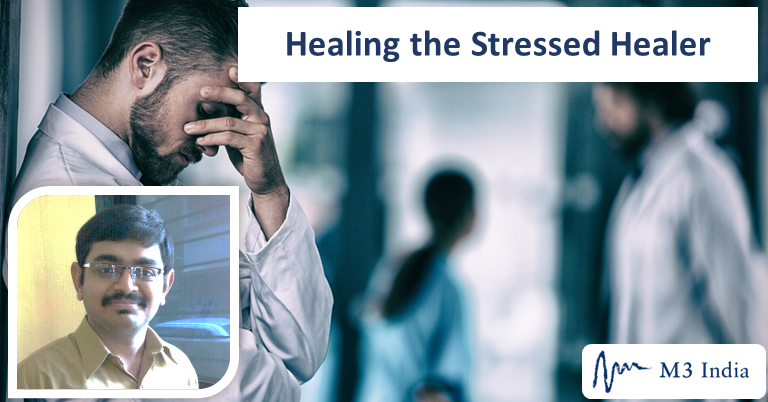Healing the Stressed Healer: Implementing the Uniform Central Residency Scheme is the right step, says Dr. Soham D Bhaduri
M3 India Newsdesk Jun 17, 2019
Dr. Soham D Bhaduri writes about a recent peaceful social media campaign- "I am overworked" among resident doctors in India, requesting better work hours and living conditions, that was apparently met with a lot of resentment and indignation from the common people.

A few days ago, I happened to come across a Facebook update of a popular news portal covering a recent initiative called “I am overworked”, a peaceful campaign by resident doctors across India aimed at demanding regulated hours and better working/living conditions from the new dispensation at the centre – which sees a medical doctor lead the union health ministry.
On occasion, I do allow myself the indulgence of skimming through the comment box, and what usually follows is an experience of thrill, but this time something different was in store. Somewhat bemused and highly dismayed, I was reminded of the resentment that doctors provoke in a certain section of common people, owing to a perception of them as an elite and uncharitable clan of professionals.
A campaign for doctors’ rightful demands, which was supposed to be sensibly interpreted and supported, became an outlet for bitterness and righteous indignation of some people who believed that doctors are only facing the Karma of being greedy and insensitive. The moral, legal, and ethical dimensions of the campaign were thus totally obfuscated.
Resident doctors deal with the bulk of patient load in their training hospitals and frequently pull-off more than 100-hour work weeks. Needless to cite the extensive body of available evidence, this takes a tremendous toll on their physical and mental health, often culminating in grave consequences such as depression and suicide – ironically during the years in which they are meant to acquire positive, life-saving skills. Around 15-30 per cent of residents screen positive for depression, while 1 in 16 report suicidal ideation.
Taking notice of this and many other issues like an undue variation in fees and stipends across the country, the Supreme Court, way back in 1987, had directed the implementation of a Uniform Central Residency Scheme. In keeping with the same, the union health ministry had in 1992 sent instructions to states and union territories. The scheme lays down a 48 hour work week under ordinary circumstances, not more than 12 hours of continuous active duty, and one weekly holiday (subject to exigencies) for resident doctors. 27 years later, implementation of this scheme remains elusive – and legit entitlements of resident doctors, an improbable luxury.
It is surprising that while we talk incessantly about improving our public hospitals and increasing public health spending, we conveniently overlook the wretched situation of the workhorses driving these institutions, namely resident doctors. Public hospitals in our country through several decades of neglect and under-investment have degenerated into a comatose state that is kept alive by the industry and ardour of none but resident doctors, frequently working inhumanly long shifts. Even prior to patients, it is they who face the direct consequences of doctor scarcity. While they are frequently reproached for their gruff and insensitive behaviour towards patients, seldom does one care to explore the possible underlying causes.
Above all, there is only scant realisation among patients and laymen of the perils that an overworked and sleep deprived resident can bring to the patient’s health in the form of medical errors and miscalculations. Even more appalling is that these residents often receive little support from the authority, including their seniors – in certain institutions, residents are paid either nothing or much less than what they are legally entitled to, and can hardly afford to speak up against such exploitation, lest their academic progress can be stymied.
Inadequate public health spending, lax enforcement of laws and regulations, ineffectual health manpower policies, and improvident application of neoliberal economic principles have together weighed down on and embittered the doctor-patient relationship in India. Further, the inglorious examples set by certain bad eggs in the medical profession (as in every other) has painted the entire fraternity with the same unsightly colours, due to which even honest and genuine causes, like those of resident doctors, fail to attract full sympathy of common people. Given these circumstances, resorting to aggressive measures such as strikes, even if they are for rightful entitlements, only further tarnish the popular image of the profession and provide a fertile environment for populist rhetoric and manoeuvres.
While it remains for the medical profession and the lay public to find out ways to better communicate one’s tribulations to another, it is for the powers that be to understand the indispensability of heeding to the afflictions of our healthcare workhorses in order to bring about any tangible improvement in the health system – and the medical fraternity, mainly seniors, to be strong and vocal in their support of the cause of resident doctors. Implementing the Uniform Central Residency Scheme, 1992 would be a great step in this direction.
Disclaimer- The views and opinions expressed in this article are those of the author's and do not necessarily reflect the official policy or position of M3 India.
The author, Dr. Soham D. Bhaduri is the Editor, The Indian Practitioner, a healthcare commentator, and a medical doctor based in Mumbai.
-
Exclusive Write-ups & Webinars by KOLs
-
Daily Quiz by specialty
-
Paid Market Research Surveys
-
Case discussions, News & Journals' summaries